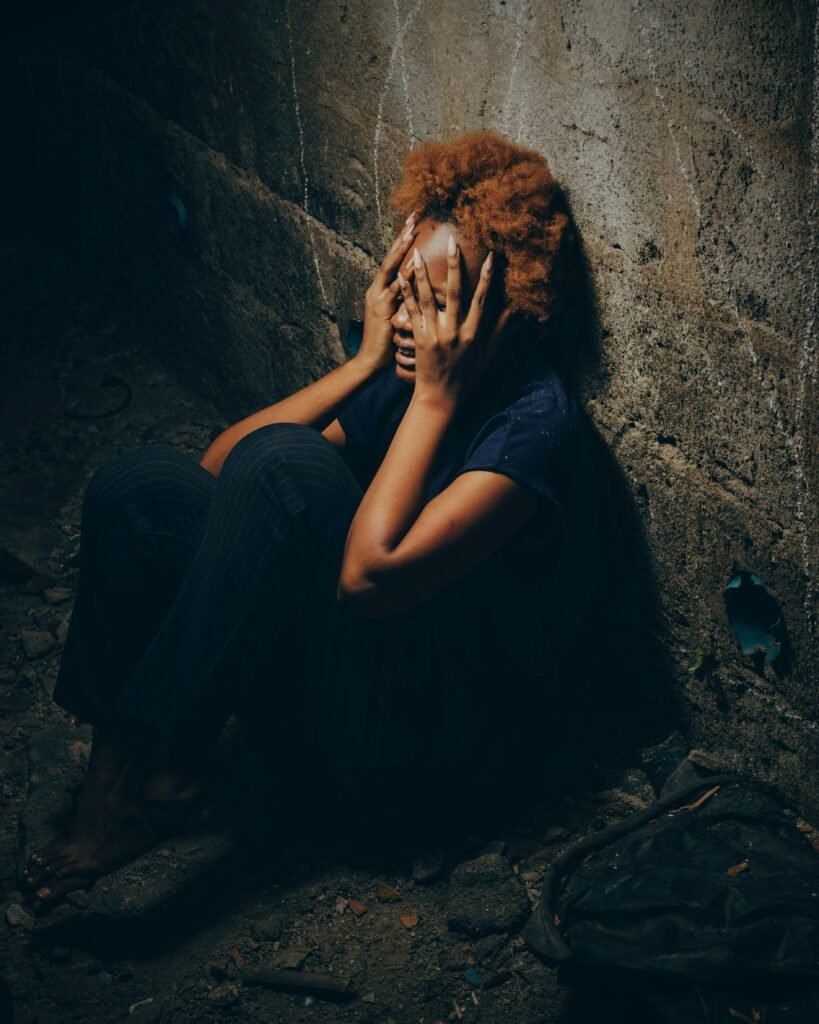Emotional breakdown crying doesn’t announce itself.
It doesn’t knock.
It crashes—suddenly, completely—right in the middle of folding laundry, or driving home, or pretending you’re fine at 2:07 a.m.
The tears aren’t just tears.
They’re a thousand unsent messages. A backlog of everything you swallowed so you wouldn’t break the rhythm of your day.
Table of Contents
If you’ve found yourself here—red-eyed, hollow, and a little ashamed—know this:
Your pain deserves a voice.
And crying, in all its unruly grace, is not a failure.
It’s your body’s final, sacred way of asking you to stop… and listen.
This isn’t advice wrapped in a smiley checklist.
This is a hand on your shoulder, saying, “Breathe. You’re allowed to fall apart sometimes.”

During an emotional breakdown crying spell, solitude can feel crushing—or strangely comforting. Discover how embracing solitude can become a quiet form of healing.
And if you’re seeking tangible comfort in the aftermath of an emotional breakdown crying episode, this ultra-soft wearable blanket feels like a warm exhale. Perfect for curling into silence without apology.
What Triggers the Breakdown?
Emotional breakdown crying doesn’t always start with tragedy.
Sometimes, it starts with a spoon hitting the floor.
A text left on “read.”
A child’s tantrum at 6:43 p.m. when your soul is already threadbare.
You don’t always see it coming. But deep down, you know it’s been building.
Every time you bit your tongue.
Every time you said, “I’m fine,” when you were anything but.
It’s the pressure of being okay for everyone else—until you’re not even okay for yourself.
An emotional breakdown is rarely about one thing.
It’s the echo of emotional burnout, suppressed grief, and the quiet exhaustion of always showing up.
When you’ve spent too long pretending not to feel, your body eventually decides to speak on your behalf.
And more often than not, it speaks through tears.
Emotional breakdown crying can be triggered by:
- Long-term stress at work or home
- Toxic relationships or unspoken resentment
- Loss—big or small, fresh or old
- Hormonal shifts, insomnia, or chronic fatigue
- The suffocating silence of being unheard for too long
And sometimes, it’s none of those things.
Sometimes, it’s just the weight of everything at once—landing when your hands are full and your heart is empty.
The danger isn’t in the breakdown itself.
It’s in not recognizing the warning signs:
The irritability. The numbness. The smile that feels like a costume.
These are your whispers before the scream.
So if you find yourself in the middle of an emotional breakdown crying alone, know this:
You’re not weak. You’re not dramatic.
You’re overdue for release.
For moments when emotional breakdown crying leaves your body tense and heavy, this microwavable aromatherapy neck wrap offers both warmth and the calming scent of lavender—like a weighted sigh against your shoulders.
What Crying Really Means
There’s something sacred about the kind of crying that comes with an emotional breakdown.
It isn’t a performance.
It’s not a single tear on a porcelain cheek.
It’s raw.
Unedited.
Ugly, in the most honest way.
Emotional breakdown crying isn’t just about sadness.
It’s rage you couldn’t voice.
Loneliness you didn’t dare admit.
Grief that’s been gathering dust in the corners of your chest.
It’s every silent scream you swallowed now flooding out in saltwater.
Biologically, crying is release.
It lowers cortisol.
It softens the nervous system.
But emotionally? Crying is confession.
A language the soul uses when words are too small for what hurts.
Have you ever cried so hard your body ached the next morning?
That’s not weakness.
That’s your pain finally being heard—by you.
Some people fear crying because they think it’s falling apart.
But maybe it’s the opposite.
Maybe it’s the first step to finally pulling yourself back together.
Emotional breakdown crying is often the truth, unclothed.
It doesn’t need an audience.
It doesn’t ask permission.
It just happens—and in its chaos, it offers clarity.
So let the tears fall.
Let them trace the outline of everything you’ve been carrying.
You’re not falling apart.
You’re letting go.

Sometimes, emotional breakdown crying is tangled in the aftermath of choices we didn’t expect ourselves to make. If your tears are rooted in guilt or betrayal, this quiet confession explores what it means to live with the weight of “I cheated on my husband.”
The Loneliness of It All
No one really talks about the silence that follows emotional breakdown crying.
The way the room feels afterward—still, almost guilty.
The way you wipe your face fast if someone knocks.
The way you avoid the mirror because even your reflection might feel like judgment.
Emotional breakdown crying often happens in private—not by choice, but by conditioning.
We’re taught to keep it together.
To smile in public, cry in the shower, and collapse only when no one’s looking.
So we do.
We fall apart at 1:14 a.m. in the bathroom.
We sob into the kitchen sink with the faucet running to muffle the sound.
We sit in parked cars, hands gripping the wheel, waiting for the storm to pass.
Because crying in front of someone feels like a confession.
And most of us have been taught to hold it in like a secret.
But here’s what they never told you:
Crying alone doesn’t mean you’re alone in your pain.
Emotional breakdown crying is universal, even when it feels isolating.
Behind every smiling face you pass in the grocery store, someone else has crumbled too.
They’ve bent over laundry baskets and wept over burnt toast and cried for reasons they still can’t name.
You are not strange.
You are not broken.
You are just human—and that’s already enough.
Loneliness loves to whisper that no one would understand.
But this page does.
And maybe, tonight, that’s a start.
If emotional breakdown crying leaves your body aching by nightfall, this ergonomic knee pillow offers deep comfort and alignment—helping you rest without tension tugging at your sleep.
The Aftermath: What Lingers When the Tears Dry
No one prepares you for the silence after emotional breakdown crying.
Not the relief.
Not the ache.
Not the strange numbness that wraps around your bones like fog.
You don’t bounce back.
You sit still.
You stare at nothing, the tears drying on your cheeks like traces of a war only you witnessed.
The house is still messy.
The problem hasn’t magically disappeared.
But something in you has shifted—subtly, imperceptibly.
Like a bone that cracked slightly to make space for the healing.
After an emotional breakdown, you might feel empty.
But that emptiness is just a pause.
A breath.
A blank page waiting for something softer.
Then the guilt creeps in.
Why did I fall apart like that?
Was it really that bad?
Why can’t I be stronger?
You replay it all in your mind, as if the crying disqualified your worth.
But the truth is: emotional breakdown crying doesn’t make you weak.
It makes you real.
It means you’ve carried more than your share and reached the threshold where silence is no longer survival.
Let yourself be tender now.
Drink some water.
Wrap up in something warm.
You don’t have to solve your whole life tonight.
You just have to rest.
Because the aftermath isn’t failure—it’s the start of release.

When emotional breakdown crying stems from love that was never returned, the ache can feel endless. This reflection on how to get over unrequited love offers a tender path through that silent grief.
Gentle Self-Care After Breaking Down
When the last tear dries and your body feels like it’s run a marathon through your own heart, that’s when the real tenderness begins.
Emotional breakdown crying takes more from you than you realize. It leaves your nervous system raw, your mind threadbare, and your soul wide open.
So don’t rush to be okay.
Don’t rush to be “normal.”
Instead, ask: What would comfort look like right now, if no one else was watching?
Here are a few gentle ways to care for yourself after breaking down:
Hydrate.
Not because it’s trendy, but because crying is dehydrating. Water is more than physical—it’s symbolic of renewal.
Wrap yourself in warmth.
A soft hoodie. A weighted blanket. Even an old sweater that smells like home.
Your skin deserves kindness after carrying so much.
Dim the noise.
Turn off your phone. Light a candle. Sit in silence. Or play the song that feels like balm.
This is about softness, not productivity.
Write it out, but only if it helps.
Scribble without rules. Burn it after if you must. There’s something healing in letting it leave your body again—this time through words.
Move, gently.
Stretch. Walk barefoot across your room. Let your body remember it still belongs to you.
Say something kind to yourself. Out loud.
Not affirmations written for someone else.
Just something simple like:
“You got through it.”
“You’re still here.”
“That was hard—and you survived.”
Because emotional breakdown crying isn’t the end of you.
It’s the start of something softer.
Something quieter.
Something more honest.
And self-care isn’t about fixing the broken parts.
It’s about holding them.
Gently.
Until they trust you enough to stay.

And if you’re looking for comfort in the quietest of places, this everyday cookbook is filled with simple, soothing meals—because sometimes healing starts in a warm kitchen, one humble bite at a time.
How to Talk About It (If You Want To)
After an emotional breakdown crying episode, the urge to talk can come in waves.
Sometimes, all you want is to bury it—deep, silent, untouched.
Other times, it sits in your chest like a stone you’re desperate to place in someone else’s hand.
But here’s the thing:
You don’t owe your pain an explanation.
You don’t have to narrate your breakdown to prove it mattered.
And yet…
If something inside you whispers “tell someone”, you deserve to listen.
Start small, if it feels safer.
“I had a hard night.”
“Everything just got too heavy.”
“I cried, and I don’t know why—but I needed it.”
Speak to someone who won’t rush to fix you.
Someone who knows how to sit in silence with your storm.
Or write it down.
Fold it into a journal or send it to the void of a notes app.
Sometimes the act of writing is enough to feel witnessed.
Therapy, too, can be sacred.
Not because you’re “broken,”
But because sometimes you need a guide who doesn’t flinch when your pain speaks freely.
There is power in silence.
There is power in storytelling.
You choose your path.
You choose when.
But never forget:
Your breakdown is valid whether spoken, written, or held quietly in your palms like prayer.
Emotional breakdown crying is already a language.
You’ve said more than enough.
Now, if you want—there’s space for more.
What the Breakdown Teaches You
You don’t always see the lesson right away.
Emotional breakdown crying isn’t tidy like that.
It doesn’t come with subtitles or moral endings.
It arrives loud, messy, and unapologetic—leaving you wondering what just happened.
But when the dust settles, something remains.
Not clarity.
Not closure.
Something quieter:
Truth.
Breakdowns peel away the layers you’ve built to survive.
The perfectionism.
The people-pleasing.
The mask that says, “I’ve got it under control.”
And in the ruins of that unraveling, you meet a version of yourself you’ve ignored.
The tired one.
The angry one.
The one who hasn’t felt safe in a long, long time.
That’s the lesson:
Your breakdown isn’t just a collapse—it’s a conversation.
Your body, your mind, your spirit—they’re all begging for the same thing:
Rest. Safety. Change. Softness.
You learn where your limits live.
You learn who shows up and who disappears.
You learn how much you’ve carried without asking for help.
And slowly—so slowly—you begin to rebuild.
Not with the same pieces.
Not with the same weight.
But with the wisdom of someone who knows: “I don’t have to wait for a breakdown to listen to myself.”
Emotional breakdown crying teaches you how to hear your own soul—before it has to scream.
When to Seek Help
Sometimes, emotional breakdown crying is a one-time storm—a needed release after a season of silence.
Other times, it becomes a cycle.
A quiet collapse that keeps coming back, closer and harder each time.
If your breakdowns feel frequent, unpredictable, or harder to recover from…
If your tears feel less like healing and more like drowning…
It might be time to reach beyond yourself.
And there’s no shame in that.
You are not “too much.”
You are not weak.
You are not broken beyond repair.
You’re just human—and humans sometimes need help carrying what hurts.

Here are a few gentle signs you might need more support:
- Crying spells that leave you drained, hopeless, or afraid
- Emotional numbness that lasts for days or weeks
- Isolation that no longer feels safe, just hollow
- Trouble sleeping, eating, or finding joy in anything
- Thoughts that scare you, or feel like they don’t belong to you
Reaching out might look like therapy.
It might look like telling a trusted friend, “I don’t feel like myself lately.”
It might even be something as simple as calling a hotline at 2 a.m.—because you matter that much.
There is help.
There are people trained to listen without judgment, to hold your pain without trying to erase it.
Emotional breakdown crying doesn’t have to be your only outlet.
There are bridges out of this place.
And you deserve to cross them.
The Night You Fell Apart
The night you had your emotional breakdown crying wasn’t a failure.
It wasn’t weakness.
It wasn’t shameful.
It was a signal.
A flare your body sent up when it couldn’t carry the silence anymore.
You didn’t fall apart—you unfolded.
You released.
You allowed the parts of you that were always screaming quietly to finally speak.
There’s a certain kind of power in the moment you let the tears fall without apology.
Not performative.
Not pretty.
Just real.
And maybe no one saw it.
Maybe you wiped your face before stepping back into the world.
But that moment changed something.
It cracked open a part of you that refuses to be ignored again.
You learned that your emotions have weight.
That your boundaries matter.
That you are allowed to be soft, even if the world keeps demanding your strength.
So here’s to the night you fell apart—and every piece of you that’s still standing.
Because the breakdown?
It didn’t break you.
It brought you back to yourself.



No responses yet